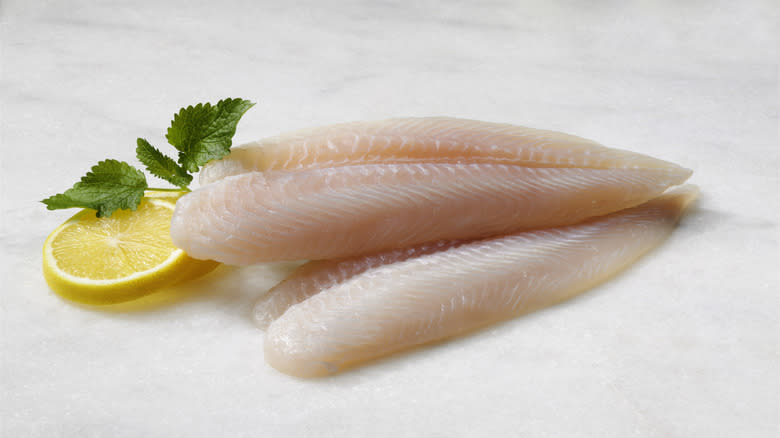Why You Should Start Using Mint To Season Your Fish

We all know the classic seasonings when it comes to fish. There's obviously salt, pepper, and garlic powder, then ginger or lemongrass if you're going for an Asian-inspired flavor, not to mention celery salt and paprika (this is what makes Old Bay and Old Bay butter such great accompaniments to seafood). With herbs, you're probably looking at something like dill (especially with salmon), or maybe thyme, sage, tarragon, or basil. You might even use a neutral herb like parsley. Oh, and mint, of course.
Wait, what? It's true: While we typically think of mint as a dessert seasoning, it doesn't have to be. Mint is a great way to provide a light, aromatic counterpoint to other spices, and it pairs particularly well with fish. A lot of cultures are ahead of the game here -- Moroccan fish stew features mint, for example -- but others don't make nearly enough use of it. If you're seasoning your fish at home, though, you should really consider throwing mint into your herb-and-spice blend.
Read more: 12 Underrated Types Of Fish You Should Try At Least Once
Mint Is Great In Seasoning Blends For Most Types Of Fish

It may seem odd to think about mint in a savory context, but it used to be more common, as mint jelly used to be served with all sorts of savory dishes. Now, it's time to bring back the mint. There's an important caveat here, though: You certainly don't want to be seasoning your fish with mint and only mint. It's fantastic in blends (as in that fish stew), but just seasoning your fish with mint and nothing else is going to make it taste like an ocean-dwelling candy cane. Most people would agree that this particular flavor combo is, perhaps, less than ideal.
But, when you combine mint with other herbs and spices, you've got some beautiful magic on your hands. It generally pairs well with all the basic spices, such as salt, pepper, and paprika (what doesn't, after all?), so there's no worry there. The floral notes of coriander are also a great counterpoint to mint. Mint's subtle sweetness even goes well with things like garlic or ginger.
As for what fish to use, you're not short on options. Any white fish, such as cod, tilapia, sole, or halibut, will work, but those aren't your only choices. Salmon is a fantastic choice, especially when you use citrus to add some acid, but even something like grouper, tuna, or swordfish would work.
Pairing Mint With Other Herbs Requires A Bit More Care

Different herbs are going to bring different things to the table, so you don't want to just throw them together and hope for the best. Mint's distinctive, cool, and mildly sweet flavor makes this especially true. Combining mint with chives and parsley in a gremolata is a good choice because those herbs are relatively neutral and allow the mint to shine. Tarragon's natural acidity works with mint for the same reason that lemon is a good pairing. Thai basil and mint, meanwhile, are a frequent combination in Southeast Asian cuisine.
By contrast, dill is a bit of an odd choice. While dill usually goes great with seafood, combining it with mint tends to get a little noisy as the two flavors fight for dominance. For a similar reason, oregano is an iffy proposition, even if some sources do recommend it. It's not that the flavors are bad together, but oregano is pretty strong, so balancing the two can be a challenge. A better substitute for oregano is marjoram, which is essentially just a milder version of the same flavor profile.
Whatever other herbs you choose, though, don't be afraid to give mint a shot in your seafood. Next time you broil some salmon, try a mint, marjoram, and tarragon combo -- you'll be amazed how well it works.
Read the original article on Daily Meal.

